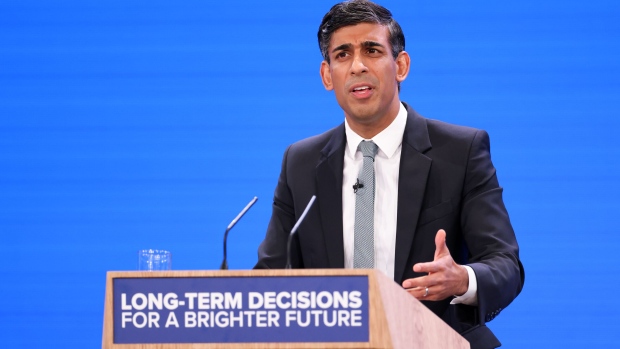Oct 9, 2023
Sunak’s Controversial Rwanda Deportation Policy Faces UK Top Court Test
, Bloomberg News

(Bloomberg) -- The UK’s controversial policy to deport asylum seekers to Rwanda stems from a “serious and pressing need” to stop asylum seekers getting into the country on small boats, government lawyers argued as scrutiny of the plans reached the nation’s top court on Monday.
A five-judge panel at the Supreme Court in London will examine whether a lower tribunal was right to rule the deportation policy — that involves flying refugees who arrive in Britain on small boats some 4,000 miles (6,437.4 kilometers) to the central African nation for processing — was unlawful. The legislation also violates European Convention on Human Rights, the Court of Appeal ruled.
There is a “strong public interest” and a “serious and pressing need” for the policy in order to stop “illegal migration” into the UK, facilitated by criminal gangs and smugglers, and deterring dangerous journeys to the UK, James Eadie, a government lawyer, said on Monday.
The case comes shortly after the Conservative Party conference where the rhetoric over immigration was dialed up with Sunak claiming he was confident of a victory in the case. “We have a moral duty to defeat this evil,” he said in reference to what he said were criminal gangs bringing would-be asylum seekers across the border.
“The policy is an inherently difficult one to achieve lawfully,” said lawyers representing asylum seekers in court documents prepared for the hearing. They argued that there’s practical risks in balancing the safety of the refugees while sending them to an “unattractive location” for future deterrence.
Sunak and Home Secretary Suella Braverman have sought to demonstrate a hard line on migration with warnings that a “hurricane” of migrants is headed for the UK and their promise to “stop the boats” bringing asylum seekers across the English Channel from France. The legislation has put arrivals into a legal limbo, with no route to seeking asylum, and the government struggling with a massive backlog of cases that’ll take years to clear.
The asylum caseload in the UK rose to 215,500 as of June, according to government data. Almost two-thirds of them were still waiting an initial decision from the Home Office. Roughly 20,100 people were recorded as entering the UK on small boats between January and August 2023.
An unfavorable ruling — which could be months away — would boost calls from the far right of the party to quit the ECHR, who they see as needlessly meddling in British law. Last year the Strasbourg-based court stopped the first Rwanda flights in an eleventh-hour intervention.
Human rights groups and opposition parties have condemned the transfer program as “cruel“ and “unworkable, unethical, and extortionate.” The plan is expected to cost the UK about £120 million ($146 million)
Human rights campaigners say leaving the tribunal which the UK helped create, would be devastating for the country’s reputation as a safe haven for those fleeing war, famine and persecution as well as representing another retreat from its position of global influence.
A group of asylum seekers and non-governmental organizations will argue that the Rwanda policy runs contrary to any commitments the UK has made in international treaties and that refugees will be put at a real risk of harm if they’re deported to Rwanda.
The United Nations High Commissioner for Refugees, which is intervening in the case, said it “maintains its unequivocal warning against the transfer of asylum-seekers to Rwanda under the UK-Rwanda Arrangement,” according to court documents.
(Updates with quotes from lawyers representing the asylum seekers in the fifth paragraph)
©2023 Bloomberg L.P.








